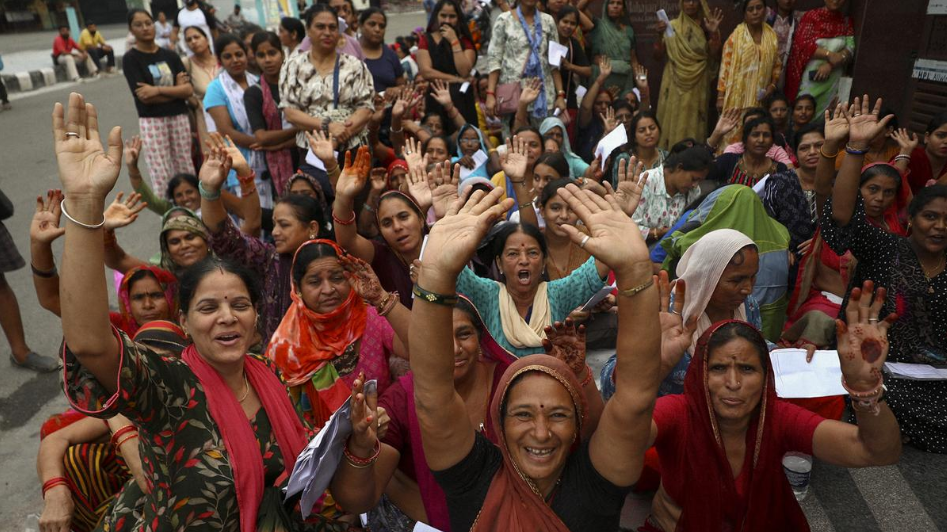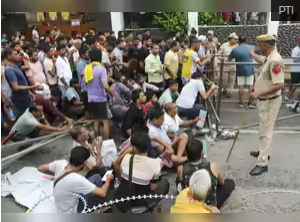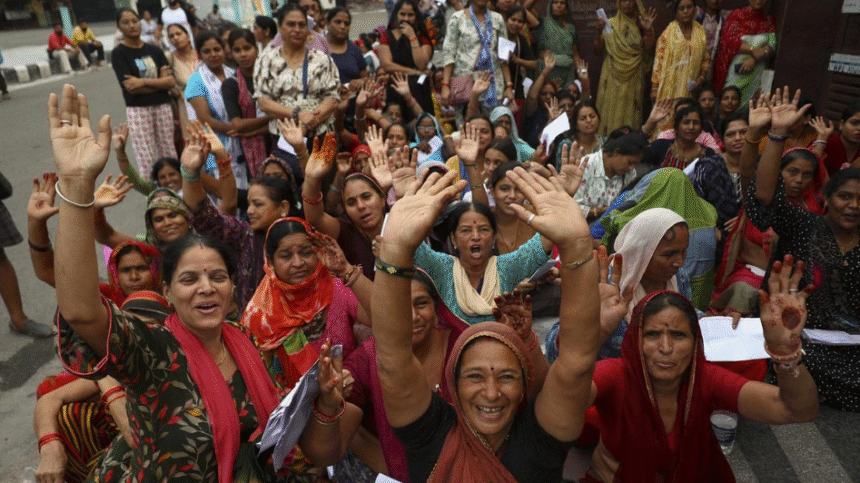1. Introduction: The Spiritual Journey Begins
Third Batch of Amarnath Yatra Every year, thousands of devotees embark on a journey filled with spiritual fervor and physical endurance to the sacred Amarnath cave shrine located high in the Himalayas of Jammu and Kashmir. This revered pilgrimage, known as the Amarnath Yatra, is one of the most significant religious undertakings for followers of Lord Shiva. As the third batch of this year’s Yatra began on schedule, 6,411 pilgrims left the Jammu base camp on their way to the holy shrine, reaffirming faith, unity, and devotion.
The Yatra, which traverses challenging mountainous terrain, draws pilgrims from across India and beyond. The diverse group included 4,723 men, 1,071 women, 37 children, and 580 sadhus and sadhvis, all moving together in 291 vehicles toward their divine destination.
2. Significance of the Amarnath Yatra
The Amarnath cave shrine, Third Batch of Amarnath Yatra situated at an altitude of approximately 3,888 meters (12,756 feet) in the Lidder Valley of Kashmir, houses a naturally formed ice Shiva Lingam, believed to represent Lord Shiva. The Lingam forms every year during the summer months, coinciding with the lunar month of Shravan (July-August), which is considered highly auspicious in Hinduism.
According to mythology, this is the cave where Lord Shiva revealed the secret of immortality (Amar Katha) to his consort Parvati. The journey to this sacred spot is thus seen as a spiritual cleansing, a step closer to Moksha (liberation), and a deeply personal encounter with the divine.  For the more information click on this link
For the more information click on this link
3. The Third Batch: A Diverse Group of Pilgrims
On this particular day, Third Batch of Amarnath Yatra the Jammu base camp at Bagh-e-Bahu buzzed with chants of “Har Har Mahadev” and “Bam Bam Bhole” as pilgrims assembled before dawn. The batch consisted of:
-
4,723 men – representing devotion and physical strength to undertake the challenging climb.
-
1,071 women – showcasing growing female participation in religious rituals.
-
37 children – some carried in their parents’ arms, others enthusiastic first-timers.
-
580 sadhus and sadhvis – ascetic devotees who travel light but radiate intense spiritual energy.
They departed in 291 well-secured vehicles under the tight supervision of the Jammu and Kashmir Police and CRPF personnel, who ensured route safety, convoy discipline, and timely movement.
4. Yatra Routes: Baltal and Pahalgam
The Yatra is conducted through two main routes:
-
Baltal Route – The shorter but steeper 14-kilometer trek from Baltal to the cave.
-
Pahalgam Route – The more traditional 36-kilometer route, which though longer, allows for better acclimatization.
Most pilgrims choose their path based on their health, stamina, Third Batch of Amarnath Yatra and desire for spiritual immersion. Sadhus often prefer to walk barefoot on the longer route, chanting prayers along the way.
The third batch was split accordingly, with arrangements made at Nunwan base camp (Pahalgam) and Domail base camp (Baltal) to receive the pilgrims before the actual trekking began.
5. Safety and Security Measures in Place
Given the sensitive nature of the region and the difficult terrain, Third Batch of Amarnath Yatra safety is paramount. The Jammu and Kashmir administration, in coordination with central forces and local police, has deployed thousands of personnel to ensure a safe and incident-free Yatra.
Key safety measures include:
-
Real-time GPS tracking of vehicles.
-
Drones and CCTV surveillance along the route.
-
Medical aid stations every few kilometers.
-
Oxygen booths at higher altitudes.
-
Quick Response Teams (QRTs) stationed at critical points.
Moreover, a mandatory health certificate and RFID tags are issued to each pilgrim, Third Batch of Amarnath Yatra helping the authorities monitor movement and health conditions.
6. Infrastructure Support: Keeping Pilgrims Comfortable
The logistics behind the Amarnath Yatra are massive. This year, the Shri Amarnathji Shrine Board (SASB) and local authorities have improved infrastructure to accommodate the swelling number of pilgrims.
Some highlights include:
-
Langars (community kitchens) set up at multiple locations to provide free meals.
-
Tented accommodations with blankets and warm clothing.
-
Helicopter services from Baltal and Pahalgam for aged and differently-abled devotees.
-
Battery-operated cars and pony rides for those unable to trek.
NGOs and voluntary groups from across the country have also set up first-aid centers, Third Batch of Amarnath Yatra massage booths, and even charging stations for phones and cameras.
7. Pilgrims’ Voices: Faith, Excitement, and Resolve
Speaking to media and volunteers at the base camp, many pilgrims shared their motivations and experiences.
Ramesh Kumar, a first-time pilgrim from Rajasthan, said:
“I have been dreaming of this Yatra for 10 years. When I finally got registered, I wept. This is not just a journey, it is a connection with Lord Shiva himself.”
Sunita Devi, traveling with her 9-year-old son, stated:
“I was nervous about bringing my child, but the arrangements are so good, Third Batch of Amarnath Yatra I feel confident. He has been chanting ‘Bhole Baba ki Jai’ all day.”
Meanwhile, Sadhu Maheshanand Giri from Haridwar shared:
“We walk with nothing but faith. We eat whatever is offered and sleep under the sky. But every step is bliss when you walk in the name of Bholenath.”  For the more information click on this link
For the more information click on this link
8. Challenges Along the Route
While the spiritual purpose remains strong, the Amarnath Yatra also presents several physical and logistical challenges, including:
-
Unpredictable weather: Sudden snowfall, rains, and landslides.
-
Altitude sickness: Due to thinning oxygen levels as pilgrims ascend.
-
Slippery paths and narrow trails: Increasing risk of injury.
-
Flash floods: A major concern, especially after the 2022 cloudburst tragedy.
This year, weather departments have installed advance warning systems, Third Batch of Amarnath Yatra and volunteers have been trained in emergency evacuation protocols to tackle any untoward incidents.
9. Role of the Government and Shrine Board
The Shri Amarnathji Shrine Board, chaired by the Lieutenant Governor of J&K, has taken meticulous steps to make this year’s Yatra safer, smoother, Third Batch of Amarnath Yatra and more inclusive. The Home Ministry has allocated substantial funds for infrastructure upgrades, medical care, and security enhancements.
The government has also appealed to pilgrims to follow the rules, Third Batch of Amarnath Yatra keep the environment clean, and report any suspicious activities or distress situations.
In addition, online registration portals and a mobile app have been introduced to provide real-time updates, weather alerts, and location guidance.
10. Environmental Concerns and Sustainability Measures
With lakhs of devotees trekking through eco-sensitive zones, concerns about environmental degradation are real. This year, authorities and NGOs have emphasized:
-
No plastic zones in and around the cave.
-
Installation of biodegradable toilets and water dispensers.
-
Encouragement to pilgrims to carry reusable bags, bottles, and utensils.
-
Deployment of cleaning squads for regular waste management.
This push toward a “Green Yatra” is seen as a critical step in preserving the fragile Himalayan ecosystem while maintaining the sanctity of the pilgrimage.
11. Conclusion: A Journey of Faith and Unity
The third batch of the Amarnath Yatra 2025, consisting of 6,411 pilgrims, is a testimony to India’s enduring spirit of devotion, resilience, and unity. In a country as diverse as India, Third Batch of Amarnath Yatra pilgrimages like this not only offer a spiritual awakening, but also act as a cultural confluence where people of all backgrounds, languages, and regions walk together with a single goal—Darshan of Baba Barfani.
As these pilgrims continue their journey toward the cave shrine, they carry with them prayers, Third Batch of Amarnath Yatra hopes, and immense faith. Their footsteps echo across the valleys of Kashmir, reminding us that no matter how difficult the path, the light of devotion will always lead the way. ALSO READ:-INDIA Bloc to Challenge Bihar’s Special Voter List Revision: A Fight for Electoral Justice 2025





